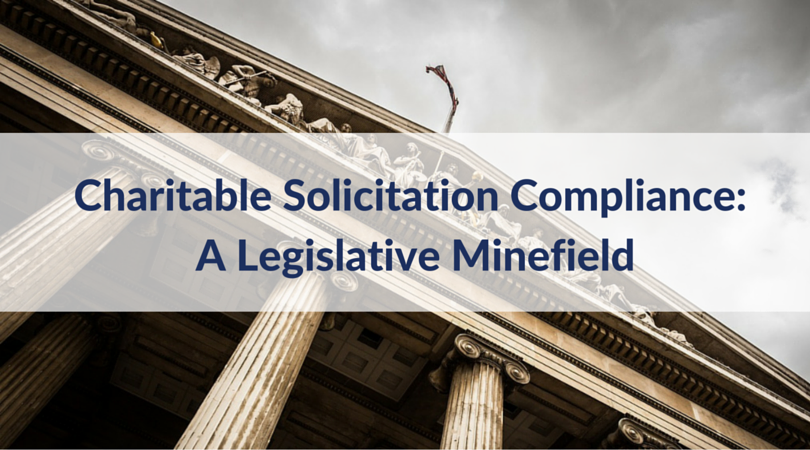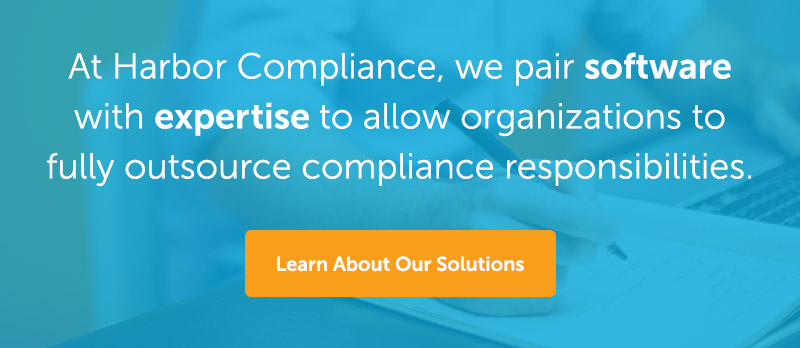-
Software
Compliance Software
Oversee licenses, track renewals, access documents, and more from a single interface.
Software Overview -
Services
Compliance Services
Full service compliance solutions for organizations throughout their entire lifecycles.
Services Overview -
Industries
-
Partner
- Information Center
Charitable Solicitation Compliance: A Legislative Minefield (Part 1)
A Series on Legislative and Administrative Changes in Charitable Solicitation Requirements
Charitable solicitation compliance is not optional; it is the law. In addition to the IRS, most states regulate charitable solicitation. 45 states have laws pertaining to solicitations that occurs within state borders. 41 of those states require charities to register to solicit. Charities that fundraise nationwide, including online, must understand 45 different requirements and identify how they apply to their situations.
To make matters worse, the laws in each state regulating charitable solicitation are constantly evolving. Whether a state requires registration can change, and when it does, the specific forms, fees, filing procedures, disclosure statements, and additional requirements can change with it.
To further complicate matters, not all requirements are spelled out in the state statutes, so the legislation does not always give a complete roadmap for filing initial and renewal applications. Additional “administrative” requirements can be a factor in a number of states. These requirements essentially boil down to preferences of the state offices that process charitable registration applications. These preferences can be updated as agencies transition from one department director to another. At times, the requirements are not even consistent department-wide. Administrative preferences can vary between document examiners in the same agency!
As if charitable registration needed to be any more difficult, the reality of a constantly changing landscape adds yet one more layer of complexity. We monitor the legislation and are aware of administrative requirements through our daily communication with the state agencies. The purpose of this series is to highlight changes to statutory and administrative changes and the “quirks” in the charitable registration process. Today’s post will cover some areas of uncertainty currently: foreign qualification, registered agent, disclosure requirements, and miscellaneous filing requirements.
Foreign Qualification
Several states require charities to complete a separate filing with the corporations division of the secretary of state prior to submitting a charitable registration application. This process involves registering the nonprofit corporation to transact operations within the state and is called foreign qualification. The application that is filed with the state is typically referred to as an application for certificate of authority, and requires a charity to list a registered agent that is responsible for receiving service of process and other legal documents on behalf of the organization. In states like Illinois and Michigan, you will submit your certificate of authority as part of your charitable registration.
In California, Florida, and Georgia, the rules are more unclear. California’s and Georgia’s charitable registration forms ask for the entity number issued by the secretary of state upon incorporation and qualification. However, there is nothing in the form’s instructions or statutes that mandate qualification. Currently, applicants can submit a charitable registration without a certificate of authority and still gain approval. However, California and Georgia likely will begin to require that entity number from the secretary of state, and the law may soon change to require the same.
Florida is even more unique. Nowhere on the form or instructions will you find a mention of foreign qualification. However, certain examiners in the Department of Agriculture and Consumer Services (FDACS) expressly look for and may reject an applicant that has not first registered with the Florida Department of State and submitted a certificate of authority. As with other agencies in Florida, we’ve found that the processing of applications can vary from one examiner to another. We generally recommend foreign qualification in Florida to preempt any issues with the applications.
Registered Agent
Several states require charities to appoint a registered agent separate from foreign qualification. The registered agent is an individual or corporation located in the state and receives service of process on behalf of the nonprofit. Approximately eight states require charities to have a registered agent, in addition to those that require appointment of an agent through foreign qualification.
Effective June 2016, the Minnesota Office of the Attorney General removed a section from initial registration and annual renewal forms that asked for the charity’s registered agent in the state. The state’s charity registrar has confirmed that a registered agent is no longer required for charitable solicitation. A registered agent is still required to meet the requirements of the Office of the Minnesota Secretary of State.
In Part 2 we will discuss legislative and administrative changes surrounding disclosure requirements, additional forms, and filings.







